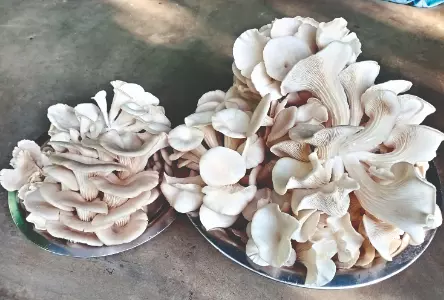
Malda, Feb. 26 -- Malda, the land of mangoes and silk, is now making a mark in mushroom cultivation. With the initiative of the district administration, mushroom farming in clusters has been steadily growing, bringing success to local farmers. Inspired by this progress, even the Chief Minister also expressed her satisfaction during her visit to the district.
According to administrative sources, mushroom cultivation in Malda began several years ago, initially taken up by self-help group (SHG) members in the English Bazar block. Farmers received training in mushroom farming from Birbhum district about a year ago and they have since been leading the way for the entire state.
Following the Chief Minister's directive, the export process of Malda's mushrooms to foreign markets has begun. To further expand mushroom farming, the district administration has introduced the cluster model, ensuring systematic and large-scale production.
Malda's district magistrate, Nitin Singhania, stated: "Both male and female members of self-help groups have been grouped into clusters. They are receiving free training to enhance their skills, leading to consistent success in mushroom production."
A district official explained that selected farmers were sent to Birbhum for advanced training, as the district is known for its high-quality mushroom farming. Upon returning, these farmers implemented the improved techniques in Malda, leading to excellent results. The initiative, which started a few years ago, has now expanded across multiple villages.
For women in self-help groups, mushroom farming has become a new source of income. Initially, the English Bazar block administration introduced mushroom farming in 11 Gram Panchayats. Gradually, the practice spread, with more SHG members joining the venture.
Free training sessions, cluster units, and regular farmer-expert meetings have been arranged to boost production. Mushroom farming in Malda primarily involves wheat-based seed preparation, where wheat grains are treated with specific chemicals to produce mushroom spores. These spores are then distributed to SHG women, who grow mushrooms in controlled environments. They mix straw, lime, and bleaching powder in a container, plant the spores, and cover them with plastic. Within one to one-and-a-half months, the mushrooms are ready for harvest and sale.
A significant achievement of this initiative is the inclusion of locally grown mushrooms in the Mid-Day Meal Scheme, providing nutritious food to school children.
A resident of Jodupur Gram Panchayat, Shibani Mandal, shared her experience: "Mushroom farming has brought financial stability to my family. The administration provides us with mushroom seeds and we cultivate them at home. We are grateful to the Chief Minister for this opportunity."
Published by HT Digital Content Services with permission from Millennium Post.
